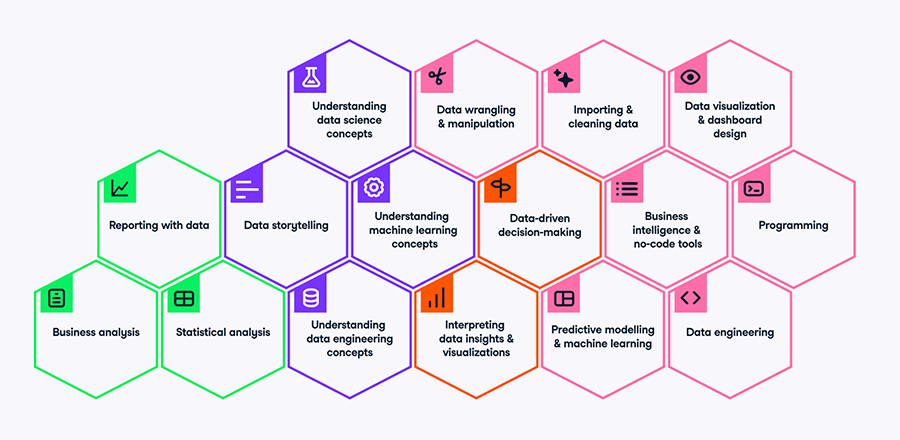Driving AI literacy through data democratization: building a data-driven culture

Data is at the core of everything. Over the past decade, there has been much ad nauseum about big data and how organizations collect and store tons of it. But surprisingly, a significant part of the data remains untapped, due to lack of data literacy.
According to a 2023 report by Data Camp, 78% of US leaders and 89% of UK leaders believe that data literacy is important for their team ‘daily tasks.

Source Data Camp
Data literacy is the ability to explore and understand data to extract nuggets of meaningful insights from it. Employees who understand, question, and argue about the data and are usually interested in its context rather than looking at it in isolation are considered as data literate. Instead of gut feelings, data-literate employees value data, balancing their decisions with experience, critical thinking and most importantly, data.
Surveyed leaders also revealed that data-literate employees led to accurate decision-making (63%), the ability to innovate (48%), the ability to create better customer experiences (41%), and more valuable qualities to the team. For organizations, these qualities are crucial for driving success and increasing enterprise value. Additionally, limited access to quality data, tools, and resources plays a major role in limiting organizations’ data literacy.
Data Democratization - An effective way to enhance Data Literacy
Data democratization can be an essential driver in improving data literacy across your organization. By lowering technical barriers, even non-technical personnel can access data to improve their data IQ. Like how a library makes reading easier, access to data helps employees understand and use it better.
Data that is not fully democratized is locked in complex technical data stores with strict and broad access restrictions. Getting access to this data requires data engineers to build data pipelines and navigate governance policies, which requires time, effort and resources. Employees interested in exploring data also need to obtain authorization to access it, making the process even more complex and cumbersome. As a result, accessing and combining multiple data sets for exploring trends and validating ideas is not worth the resources required to access and scrub the data.
A data democratization strategy empowers data consumers with the tools and authority to access relevant data sets, promoting data sharing across departments and data silos. This allows employees to explore new data and expand their understanding, encouraging cross-domain discussions.
While data democratization can positively impact data literacy, without effective training, the system could break down. Let's take an insight from democracy, where an educated electorate can make all the difference. Similarly, democratizing data requires employees to be well-trained and educated. The basic knowledge of statistics, such as averages, medians, and standard deviations along with knowing the difference between correlation and causation and signal vs. noise is essential.
While data democratization can have positive impact on data literacy, without effective training, the system could break down. Just like democracy as a form of government does not work well with and uneducated electorate, democratizing data also requires education and training. Data literate workers should understand the basics of statistics. They should understand the concepts of average, median, and standard deviation. They need to understand the difference between correlation and causation and signal vs. noise is essential.
With proper training and access, employees can communicate insights effectively and make narrative-driven decisions based on data. This combination of data literacy and business experience can empower employees to leverage data for insight-driven decision-making, creating significant business value and driving enterprise performance.
Providing tools and changing mindsets drive employee performance which will increase the likelihood of job satisfaction and longer stay with the firm. According to Tableau, 80% of employees are more likely to stay with a company that offers data-skilling programs.

With greater access, employees can be inspired to expand their knowledge and drive further exploration and understanding. This feedback loop leads to increased knowledge, literacy, better decisions, innovation, and higher enterprise value.
Data literacy Helps Build AI literacy
Generative AI is booming in the tech industry. With the emergence and usage of ChatGPT, we can witness this tremendous change. As organizations have started incorporating AI, learning how to maximize its benefits and minimize the risks has become important. And that's where AI literacy comes in.
Simply put, “AI literacy is the expansion of data literacy.”
Like data literacy, AI literacy involves the skills and competencies that are needed to use AI technologies effectively. While AI literacy includes additional professional competencies, it starts in the same place as data literacy with critical thinking. Being relatively new in the industry, the confusion regarding its functions and capabilities is obvious. AI literacy requires the basic understanding of how AI works. One may not need to know sophisticated math and statistics behind the algorithms but should grasp the underlying concepts.
Key concepts to understand include neural networks, decision trees and linear regression. It's crucial to understand the capabilities of these models, especially what they can and cannot do even if there is no need to build a linear regression model by yourself.
AI literacy similar to data literacy, involves collection & processing of data while understanding its impact on the generated AI output. Also, acknowledging the role of synthetic data shouldn't be overlooked.
An important part of AI literacy is identifying where AI models can go wrong. It’s essential to identify biases in models to ensure that they are used ethically and effectively. AI models are constantly evolving and new data can cause models to drift, leading to performance issues. Date-literate employees need to be aware of this risk.
Data-literate employees have the potential to see beyond typical AI use cases and innovate. They can become AI-literate and learn to scale the value they contribute and boost their productivity. Maintaining a healthy skepticism around data quality is essential to prevent AI models from making significant mistakes or amplifying biases.
Data-literate employees can grasp the quality and nuances of data used to train data models and interpret their behaviors and outputs.
Implementing Data Democratization and AI Literacy in Organizations
As AI is gradually becoming common, it will be important for people to be able to monitor and regulate functions. Having employees who are knowledgeable about data and AI in your organization reduces the risk of major AI mistakes. Organizations with a majority of employees having the understanding of how AI works and testing tools and data at their availability and integrated into workflow will have a competitive advantage. If every employee can test a model whenever they notice an unusual output, the likelihood of certain AI errors will decrease.
The way humans and machines interact with data will significantly impact organizational performance. Better collaboration between people and machines through fewer barriers and friction will increase the opportunity to collaborate around data and drive greater organizational performance.
Data democratization not only increases the productivity of typical employees but also benefits highly skilled data scientists. With data democratization, data scientists can access discreet data sets that may reside across the organization to enhance the performance of their models. Without a data democratization and data discovery strategy, data scientists may not even be aware of the existence of data sets that could improve their model. Additionally, without access to all relevant data, data scientists may end up using poor data sets with errors or biases which can compromise the AI strategy.
Fostering Data Literacy & AI in Organizations
Integrating data democratization, literacy and training into your culture will drive better outcomes. Easy access to training is a simple way to help drive data and AI literacy. Deploying a data democratization strategy may require a bit more investment. Facilitating seamless data access empowers the team to utilize their skills and contribute to the enhanced performance. Organizations can identify experienced data scientists who can take the leadership roles to drive greater literacy throughout the organization.
One of the effective ways to make employees feel confident and empowered about data culture and AI is by engaging them in data chats and participating in data storytelling exercises. As a result, organizations equip their employees with a data-driven mindset which helps them make informed decisions based on data insights.
Request a Demo TODAY!
Take the leap from data to AI
